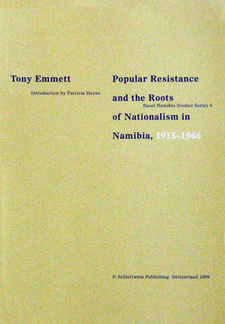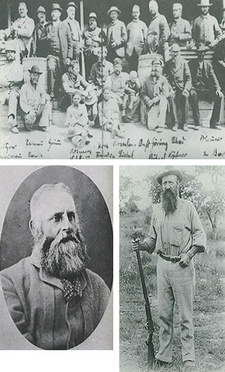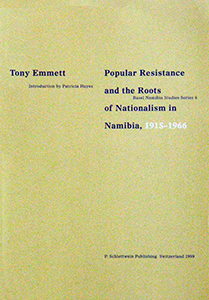Popular Resistance and the Roots of Nationalism in Namibia, 1915-1966, by Tony Emmett

Popular Resistance and the Roots of Nationalism in Namibia, 1915-1966, by Tony Emmett. Basel Namibia Studies Series, Vol. 4. Schlettwein Publishing. Basel, Switzerland 1999. ISBN 9783936858617 / ISBN 978-3-936858-61-7

Historical photos from Popular Resistance and the Roots of Nationalism in Namibia, 1915-1966, by Tony Emmett.
In this study of the roots of anti-colonial resistance and nationalism, Tony Emmett explores the social forces that shaped the development of a movement of national liberation in Namibia.
Introduction by Patricia Hayes:
Tony Emmett's published work on resistance to South African colonial control in the 1920s' is far better known to students of Namibian history than his doctoral thesis. Its publication here is long overdue, as is the serious attention that this work deserves. What is so impressive for its time is the sheer number of crucial issues opened up by the thesis in one coherent framework. The author allows us to get an overarching picture of the course of colonial struggles as the boundaries of a Namibian 'nation' took shape in the 20th century. This is the stuff to inspire productive new directions in historical research, and recent historiography has indeed picked up on key themes first set out by Emmett. But the largeness of the project, questions over its contents and methodology, should stimulate much wider debate now that it will meet many new audiences as a book. This is a political history which attempts to look at the internal dynamics of protest, by setting episodes of resistance in their socio-economic (and even ecological) contexts. Often, it is the contexts themselves which turn out to be remarkably useful. Emmett provides one of the earliest analyses of South African colonial administration from its outset in 1915, and shows convincingly that there were distinct phases to it. In contextualising the basis of OPO and later SWAPO support, he engages with one of the few areas of density in the literature on Namibian history, that of migrant labour. At times Emmett depends more on existing literature than on raw archival sources in order to sketch out resistance narratives. He thus relies on the writings of other historians (or anthropologists) on the German period when tracing the longer trajectory of Bondelswarts history, or when setting out his account of the Rehoboth rebellion in 1925, or when discussing migrant Ovambo 'brotherhood' cultures. But while he may have less of his own original research work to foreground here, what is so valuable is the reworking of these writings into a much larger picture. In effect it provides a grounding narrative from which to view and interpret opposition to colonial rule before the launching of the armed struggle by SWAPO in 1966. This becomes especially important when the narrative builds strongly on sources which are not part of any hegemonic nationalist 'archive' or historiography. Most striking of course are the insights provided by the substantial Kozonguizi archive. This 'dissident' archive as it were occupies a very interesting space in showing the early nationalist organisations through the critical eyes of a self-confessed intelligentsia. These mainly Herero-speaking intellectuals in SWANU made their mistakes, some of which are acknowledged, and they effectively lost out in the bid to attract mass national, as well as wider African and international support, against South African occupation. But the dissident archive shows more than anything else the complexity, diversity and potential for alternatives in the early nationalist movements in Namibia. This archive ensures that any single, triumphal narrative of victory by 'the sole and authentic representative' of the Namibian people, SWAPO, must be questioned from its outset. Such questioning is easier for us now, in hindsight, than it was for Tony Emmett writing at the height of the struggle years (late 1970s to 1980s). The historical context in which he wrote was very specific. [...]
This is an excerpt from the study Popular Resistance and the Roots of Nationalism in Namibia, 1915-1966, by Tony Emmett.
Title: Popular Resistance and the Roots of Nationalism in Namibia, 1915-1966
Author: Tony Emmett
Series: Basel Namibia Studies Series 4
Publisher: Schlettwein Publishing
Basel, Switzerland 1999
ISBN 9783936858617 / ISBN 978-3-936858-61-7
Softcover, 17 x 24 cm, 389 pages
Emmet, Tony im Namibiana-Buchangebot
Popular Resistance and the Roots of Nationalism in Namibia, 1915-1966
Anti-colonial resistance and nationalism - the social forces and movement of national liberation in Namibia

